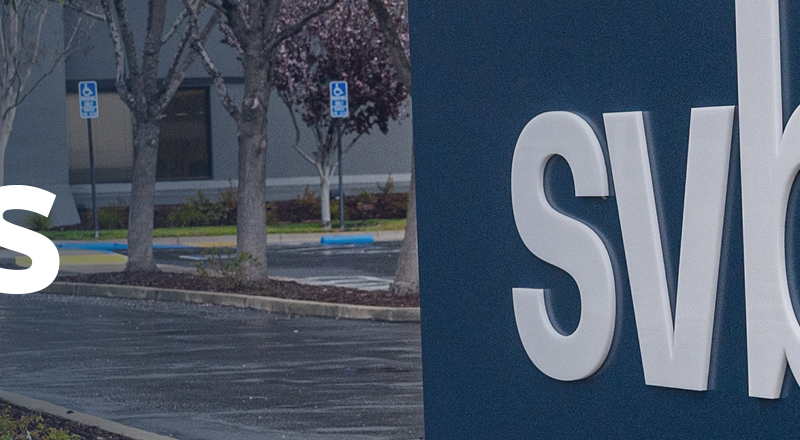For startup competition, SVB’s nightmare is a win and a dare
Sometimes, leaving stealth isn’t your own choice: It’s a force function of two of your largest competitors evaporating from the business, and the third triggering clients so much that there’s a talk of a bank run. At least that’s the case for Series CEO Brexton Pham, who has been building a full-stack enterprise platform for institutions and enterprises since March 2021.
As a threat of a bank run looms at Silicon Valley Bank, days after Silvergate’s meltdown and impending shut down and Signature Bank’s ongoing step back from crypto customers, Pham has found himself in “the nuttiest week ever.” Series, which offers corporate bank accounts, is getting inundated with inbound messages, entire portfolios of VC firm — and the pace of inbound is ramping up by the hour. The CEO says their inbox is like a second application portal.
And despite the idea that competitors might have a field day with the spotlight, Pham is cautious, saying that Series is only onboarding “select startups” while other startups may run the risk of being too risk tolerant with compliance to speed up onboarding processes.
“If [you’re a] YC-backed neobank and you wanted to acquire all of the startup customers, today’s the day to do it,” Pham said to TechCrunch. (YC CEO Garry Tan told YC companies, according to an internal screenshot seen by TechCrunch, that “anytime you hear problems of solvency at a bank, and it can be deemed credible, you should take it seriously and prioritize the interests of your startup by not exposing yourself to more than $250,000 of exposure this year.”)
“The problem is, that’s the easiest way to invite fraud and get kicked out of the banking ecosystems — there’s actually nothing stopping banks from onboarding people in five minutes,” even though the founder thinks it should take four to five days to do proper diligence. The startup, which was originally going to launch publicly in Q3, has done more onboarding in the past day than in the past month.
“As someone who works in fintech, SVB is going to be fine. It’s SVB… I actually fully believe that they’re fine,” Pham said. “It is in your best interest to just diversify and build redundancy with your banking partners and have multiple banking relationships.” Still, Pham says that account opening applications have increased more than 10x in just the last 24 hours. “Today’s volume is close to double yesterday’s, too, since we’re now seeing FRB migrations,” Pham said.
All competitors are hoping that they’re not just a place for startups to park idle cash, but also become a primary bank and help with integrating payroll and recurring payments. While some are cautious, others are aggressive.
YC-backed startup Arc CEO and co-founder Don Muir said that “this is a COVID moment for financial services,” as demand for digital banking gets accelerated.
“This is a time where all of a sudden startup founders, CEOs, operators are scratching their heads and saying wait a minute, maybe my bank deposits are not as safe as I thought with a traditional bank,” Muir said. “Maybe technology can actually provide a level of diversification of my deposit base that a traditional financial institution simply cannot compete with.”
Arc is helping software and API-driven companies deploy deposits “at the click of a button… it’s something that takes offline banks weeks to months to do,” Muir said. The fintech started out offering upfront cash for recurring revenue but has since evolved to also offering digital banking services; Arc says it’s received a ton of inbound since the news broke on Thursday.
“We’ve had a huge wave of tech companies at all stages — from seed to Series D — moving over to Arc over the last 24 hours,” Muir told TechCrunch. In direct response to the SVB news, Arc has seen its backlog of deposits “more than double” to the tune of hundreds of millions of dollars, he said.
“All that is coming online today and Monday as wire transfers are processed,” he said, noting the caliber of startups coming to their stack. Naturally, Muir claims that because most fintechs such as Arc are not actual banks, they actually can serve as a safe harbor for companies and provide a more diversified banking experience. “We can take all excess cash that is not FDIC-insured and spread it out across other financial institutions, SIP-insured funds and directly into government securities,” he said.
And Mercury, a fintech company that has been focused on offering banking services to startups since 2019, also says it has received a lot of inbound interest.
Co-founder and CEO Immad Akhund told TechCrunch that Thursday and Friday “have definitely been busy days” and that the company is “focused on onboarding clients quickly and giving them the best customer experience.”
The company last year began offering venture debt in a direct swing at Silicon Valley Bank. At the time, it had 60,000 businesses on its platform. Like a lot of fintech startups, Mercury — which is not a bank itself but a banking platform that offers FDIC-insured products through Choice and an Arkansas-based bank called Evolve Bank & Trust — has been vocal about its belief that bigger rivals like SVB are “cumbersome and don’t understand the changing expectations of its customers,” as TechCrunch’s Connie Loizos has reported.
Meanwhile, Ben Verschuere, co-founder and chief investment officer of fintech Treasure, said his company has “seen a large inflow of deposits…to be allocated to safe goverment back securities.”
“Within hours we have seen more than a 25% increase in our AUM and an increase of more than 20% in terms of new account opening,” he said. “We have also seen a 500% increase on our website.” And, Stephane Lintner, CEO/co-founder of Jiko, said his startup “has seen a major spike” in demand for its T-bills offering “as firms look to secure financial instruments like Treasury bills to park cash.”
Founderpath, a company which aims to help B2B SaaS founders grow their businesses without diluting ownership, said it is “getting inundated with tons of founder requests.”
“Many founders have millions stuck at SVB and need $500,000 to process payroll next week,” said founder Nathan Latka. “We’re wiring short term non-dilutive financing to many of these founders right now. No prepayment penalties once they want to pay us with their SVB funds – once they are released.”
Over in Europe, sources say that “many” international startups who had SVB accounts because they raised money from U.S. VCs have reportedly moved money to Revolut Business accounts and Wise Business accounts.
Brex, for its part, is fast-tracking founders who want to spin up bank accounts at their business, last valued at $12.3 billion. On Thursday night, one founder tweeted that Brex sent an email to users saying that its business is not affected by “current banking volatility.” Brex did reportedly get billions in deposits from SVB customers overnight. Those looking to switch banks are also being told to reach out to VIP support.
Then on Friday, Brex said it is now offering an emergency bridge credit line for SVB customers migrating to one of its business accounts. The company emphasized that it is not directly funding the credit line, but rather that is being handled by “third-party capital” who is working with Brex “to minimize the impact of this event to the startup ecosystem.”
Co-CEO and co-founder Henrique Dubugras told TechCrunch that there is “no cap.” The news is particularly interesting considering that Brex made headlines last summer for its decision to no longer work with certain small businesses, or non-institutional funded startups. While its latest move can only boost its own business, as Axios’s Dan Primack noted, it could also “be a lifeline for certain companies.”
The big question ahead is whether founders leaving SVB want to trust a tech startup or neobank with their precious capital just hours after fearing for its stability.
Jeff Richards, a venture capitalist at GGV Capital, wrote on Twitter that he’s “surprised by the ‘move your cash from a bank to a startup fintech’ posts but I guess we’re in a financial Darwinism phase.” He added in a later thread, “I personally would not recommend having corporate cash with a non-public co. Will leave it at that,” to which one investor said, “prudent.”
Richards’ perspective is different from some other VCs, who are parroting their portfolio companies to other banks — some of which they just happen to have a vested interest in. Peter Thiel’s fund, Founders Fund, told portfolio companies to leave SVB, reported Bloomberg yesterday. The same fund is invested in Treasure Financial, which, according to sources, saw about $50 million in demand within one hour of SVB’s news.
If you have a juicy tip or lead about happenings in the venture world, you can reach Natasha Mascarenhas on Twitter @nmasc_ or on Signal at +1 925 271 0912. You can reach out to Mary Ann Azevedo on Twitter @bayareawriter or on Signal at +1 408.204.3036. Anonymity requests will be respected.





